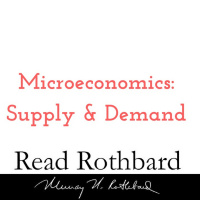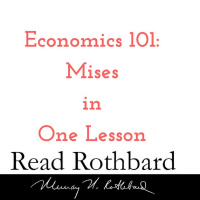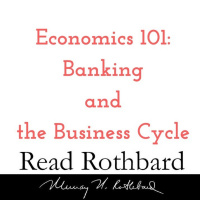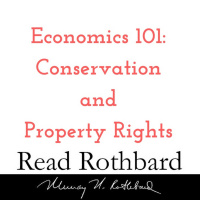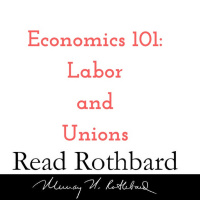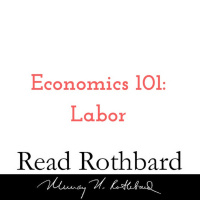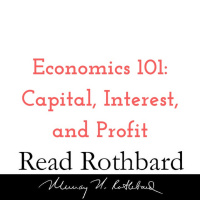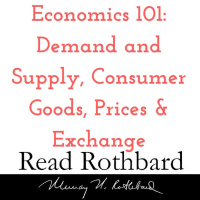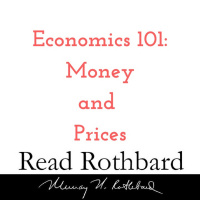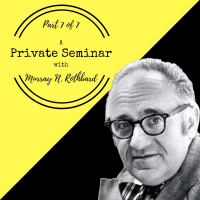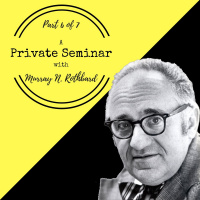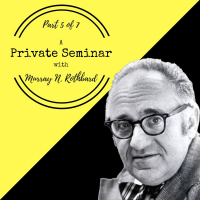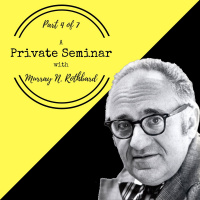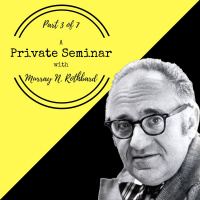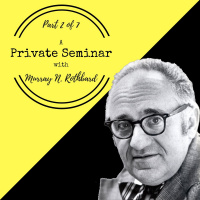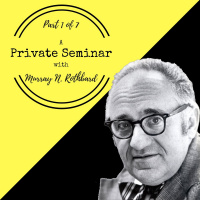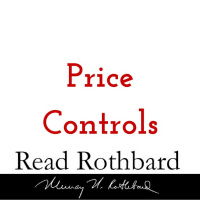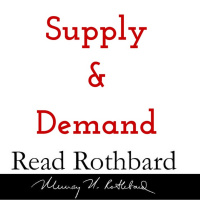Sinopse
Lectures by Austrian Economist and Libertarian, Murray N. Rothbard.Read Rothbard is comprised of a small group of voluntaryists who are fans of Murray N. Rothbard. We curate content on the www.ReadRothbard.com site including books, lectures, articles, speeches, and we make a weekly podcast based on his free-market approach to economics. Our focus is on education and how advancement in technology improves the living standards of the average person.The Read Rothbard Podcast is all about Maximum Freedom. We look at movies and current events from a Rothbardian Anarchist perspective. If it's voluntary, we're cool with it. If it's not, then it violated the Non-Aggression Principle and Property Rights - the core tenants of Libertarian Theory - and hence - human freedom.Website: http://www.ReadRothbard.comiTunes: https://itunes.apple.com/us/podcast/the-read-rothbard-podcast/id1166745868Google Play Music: https://play.google.com/music/m/Ii45fhytlsiwkw6cbgzbxi6ahmi?t=The_Read_Rothbard_PodcastFacebook: http://www.facebook.com/readrothbardclubFlickr: https://www.flickr.com/gp/145447582@N05/xB4583Patreon: https://www.patreon.com/ReadRothbardPresented by Read Rothbard.Read Rothbard is comprised of a small group of voluntaryists who are fans of Murray N. Rothbard. We curate content on the www.ReadRothbard.com site including books, lectures, articles, speeches, and we make a weekly podcast based on his free-market approach to economics. Our focus is on education and how advancement in technology improves the living standards of the average person.The Read Rothbard Podcast is all about Maximum Freedom. We look at movies and current events from a Rothbardian Anarchist perspective. If it's voluntary, we're cool with it. If it's not, then it violated the Non-Aggression Principle and Property Rights - the core tenants of Libertarian Theory - and hence - human freedom.Website: http://www.ReadRothbard.comiTunes: https://itunes.apple.com/us/podcast/the-read-rothbard-podcast/id1166745868Google Play Music: https://play.google.com/music/m/Ii45fhytlsiwkw6cbgzbxi6ahmi?t=The_Read_Rothbard_PodcastFacebook: http://www.facebook.com/readrothbardclubFlickr: https://www.flickr.com/gp/145447582@N05/xB4583Patreon: https://www.patreon.com/ReadRothbard
Episódios
-
Episode 20 - Introduction to Microeconomics - 1 of 14 - Demand and Supply - Murray N Rothbard
06/12/2016 Duração: 01h01minINTRODUCTION TO MICROECONOMICS Presented by Murray N. Rothbard in 1986 at New York Polytechnic University. Recorded by Hans-Hermann Hoppe. 1. Intro to Micro: Demand and Supply Micro means dealing with the individual action. Macro deals with larger pictures of business cycles. Macro is screwed up. Micro is in pretty good shape. Study it first. Every individual has goals they wish to achieve.You use means to achieve goals. Economic theory is based on this deductive fact that the individual wants to arrive at goals - the means-ends objective. Part 1 of 14. Presented in 1986 at New York Polytechnic University. This lecture on YouTube: https://youtu.be/VHPk-WrTBAE Sourced from: https://mises.org/library/introduction-microeconomics We are not endorsed or affiliated with the above. https://creativecommons.org/licenses/by-nc-nd/3.0/legalcode Presented by Read Rothbard: Read Rothbard is comprised of a small group of voluntaryists who are fans of Murray N. Rothbard. We curate content on the www.ReadRothbard.c
-
Episode 19 - Economics 101 - 8 of 8 - Mises in One Lesson - Murray N Rothbard
02/12/2016 Duração: 01h22sECONOMICS 101 Murray Rothbard's Economics 101 series 8. Mises in One Lesson Austrian economics has nothing to do with the economics of Austria. Austrian Economics (AE) began with Carl Menger in 1871. It is based on an analysis of individual action, not aggregates or groups. Economics predated Adam Smith. The British classical economics school could not solve the value paradox. It also embraced the labor theory of value. Another big fallacy was a focus on long-run equilibrium. Additionally, they separated micro and macroeconomics into two hermetically sealed spheres. Menger and Bohm-Bawerk focused systematically on individual action. The purpose of production is consumption. Value is inferred by the consumer in a subjective marginal unit value theory. This solved the value paradox. Economics is not really a quantitative subject. Value is subjective and cannot be measured. Preferences are ordinal, not cardinal. There is no separate process called distribution. Distribution comes right out of production. Pe
-
Episode 18 - Economics 101 - 7 of 8 - Banking and the Business Cycle - Murray N Rothbard
30/11/2016 Duração: 01h38minECONOMICS 101 Murray Rothbard's Economics 101 series 7. Banking and the Business Cycle One of the most difficult things to understand about banking is how money is created out of thin air. Current commercial bank liabilities are immediate. The banks do not have the reserves to redeem all demand notes. Thus, banks are inherently insolvent. But, government has eliminated runs on banks. Banks are not allowed to fail when they are mismanaged. Central banks are sold to the public as restraining inflation, but central banking was created to allow inflation. The inflationary process generates the boom and bust business cycle. The Bank of England was a great racket. The public accepted new money that was created out of thin air. The King had given the Bank a monopoly on money creation. President Jackson tried to get rid of the US central banks. Banks created the Federal Reserve System in 1913. The Fed banks now have a monopoly on all paper money. By legal tender law, one must accept Federal Reserve Notes. The F
-
Episode 17 - Economics 101 - 6 of 8 - Conservation and Property Rights - Murray N Rothbard
28/11/2016 Duração: 54minECONOMICS 101 Murray Rothbard's Economics 101 series 6. Conservation and Property Rights Free markets shift resources from where they are less valued to where they are most valued, benefiting consumers. When private property and free markets are allowed to operate, a natural conservation of resources occurs. Nothing is a resource unless it is useful to man. Governments do not own anything and are not interested in preservation or maintenance. The conservation movement since 1900 simply closed off land. Western railroads and Western real estate owners financed the conservationists in order to keep land off the market. Oceans have yet to adopt private property rights, but it will be needed to end ocean communism which depletes fisheries. The law of capture produced such over drilling and depletion in oil. Radio and TV channels have to find a technological unit like bandwidth or frequency to define private property. Hoover nationalized the radio channels. This totalitarian control over media by the FCC is
-
Episode 16 - Economics 101 - 5 of 8 - Labor and Unions - Murray N Rothbard
23/11/2016 Duração: 01h27minECONOMICS 101 Murray Rothbard's Economics 101 series 5. Labor and Unions Rothbard covers the principles of demand and supply curves. Prices are at the seat of the whole system. Use the logic of reality. The most mobile labor force is teenagers. Over time, capital equipment per laborer increases. Real wage rates increase. Consumer prices decrease. Unions cannot determine wage rates without putting companies out of business and causing unemployment. They attempt to control the labor market by restricting people. Unions have very little power when labor is ample. There were no labor unions from 1885 to 1935. Unions were first established in construction, coal mining, and entertainment fields, but they were a small percent of the workforce. The National Labor Relations Board determined what a bargaining unit was. They preferred industrial unions to craft unions. Unions made employment government-regulated rather than free-market. Union growth has been in government agency areas. The fifth of eight sessions
-
Episode 15 - Economics 101 - 4 of 8 - Labor - Murray N Rothbard
21/11/2016 Duração: 50minECONOMICS 101 Murray Rothbard's Economics 101 series 4. Labor Minimum wage laws force unemployment up. All of those with few skills looking for an entry position will be denied because they cannot add enough value to the business labor field to be paid minimum wage. Unemployment follows minimum wage hikes. Marginal workers are being denied the labor market. There were workers in canning businesses making thirty cents an hour who were disemployed when a forty cents minimum wage was enacted. By changing definitions of employment government agencies manipulate figures. Population growth issues have often been irrational. Overpopulation in one area could be under population in another. Optimum (maximum) populations depend on market systems and capital investment. As levels of living rise, parents decide upon lower birthrates. The fourth of eight sessions from Murray Rothbard's Economics 101 series. A collection of eight speeches and lectures by Murray N. Rothbard, spanning from the 1970s to the early 1990s
-
Episode 14 - Economics 101 - 3 of 8 - Capital, Interest, and Profit - Murray N Rothbard
15/11/2016 Duração: 54minECONOMICS 101 Murray Rothbard's Economics 101 series 3. Capital, Interest, and Profit Profit is total revenue minus total costs. Ours is not just a profit system, it is a profit and loss system. Losses are a sign that you wasted land, labor, or capital, yet those who make profits are criticized. Entrepreneurship is an art not a course you can learn. Labor earns wages. Land earns rent. Capital earns interest. Confusingly, the word capital means both the machines used to produce goods and the funds available for investment. Bohm-Bawerk answered the question of where interest rates come from. Time is the key element in the earning of interest. The capitalist who pays out while he waits for the product to be sold before being paid, performs a vital function of paying for land and labor now. The capitalist is rewarded by being paid a discount on labor and land, discounted by the rate of interest. There are all sorts of rates of time preferences. The third of eight sessions from Murray Rothbard's Economics 10
-
Episode 12 - Economics 101 - 1 of 8 - Demand and Supply, Consumer Goods, Prices and Exchange - Murray N Rothbard
07/11/2016 Duração: 53minECONOMICS 101 Murray Rothbard's Economics 101 series 1. Demand and Supply, Consumer Goods, Prices and Exchange Micro economics starts with the basic fact that each person has short term and long term goals, like buying a ham sandwich and graduating from college. People act in the world to accomplish something. Human action is purposive. You employ different means to achieve certain goals. Rothbard begins with the simple situation of Crusoe – one laborer- on an island. Capital is everything used in production that is not land or labor. Production ends up with consumer goods which are consumed. The free market coordinates everything. No world planning board can do this. Micro economics is the study of how all this works. Resources are scarce not superabundant. Humans prefer stuff now rather than later. This is called time preference. Preferences are ordinal, (a, b, c), not cardinal (1, 2, 3). Action is risky. The entrepreneur is a risk-taking capitalist. Our discipline is qualitative, not quantitative. The
-
Episode 13 - Economics 101 - 2 of 8 - Money and Prices - Murray N Rothbard
03/11/2016 Duração: 55minECONOMICS 101 Murray Rothbard's Economics 101 series 2. Money and Prices Many believe that if governments would just issue greater quantities of money then all problems would be solved. In truth that would create unsurmountable problems by lowering the purchasing power of each money unit. Money is the one good that is not made better by increasing its supply. Rothbard discusses how money originates. Products are originally merely exchanged between people. This is the barter system and it is based upon the double coincidence of wants. Very shortly, one or two commodities like wheat or tobacco emerge on the market as more marketable than others. Money is now a medium of exchange. Calculations and the process of accounting become possible when there is money. Gold and silver emerged over years as the best money. Metals were exchanged in measures of weight, like grams. The slippery slope was created when, instead of weights, names were used for money like francs or dollars. The second of eight sessions from
-
Episode 11 - Introduction to Economics Part 7 of 7 - Murray N Rothbard
01/11/2016 Duração: 25minIntroduction to Economics: A Private Seminar with Murray N. Rothbard Deficits are equal to expenditures minus taxes. Reagan spoke of cutting government spending, but meant only cutting the rate of growth of government spending. Stagflation appeared in 1957-58. Inflation during a recession was not supposed to happen. It happened again in 1973-75. The file stops at 7:01 and unfortunately the rest of the lecture is lost. Part seven of seven from Introduction to Economics: A Private Seminar with Murray N. Rothbard. This lecture on YouTube: https://youtu.be/4IGn9Hl-op0 Sourced from: https://mises.org/library/introduction-economics-part-7 We are not endorsed or affiliated with the above. https://creativecommons.org/licenses/by-nc-nd/3.0/legalcode Presented by Read Rothbard: Read Rothbard is comprised of a small group of voluntaryists who are fans of Murray N. Rothbard. We curate content on the www.ReadRothbard.com site including books, lectures, articles, speeches, and we make a weekly podcast based on
-
Episode 10 - Introduction to Economics Part 6 of 7 - Murray N Rothbard
01/11/2016 Duração: 45minIntroduction to Economics: A Private Seminar with Murray N. Rothbard What causes business cycles? Keynesians say the cycles happen because the free market economy does not spend enough. Thus, pump spending in. Additionally, Keynesians say that animal spirits cause these cycles. Government must fix things. Nobody could understand Keynes' General Theory. What was simply obscure was wrongly considered deep. Keynes linked national income with employment, by assuming wage rates are fixed downward. Although Keynes wrote of balanced budgets, there were only deficits. Part six of seven from Introduction to Economics: A Private Seminar with Murray N. Rothbard. This lecture on YouTube: https://youtu.be/wng1I59zr5s Sourced from: https://mises.org/library/introduction-economics-part-6 We are not endorsed or affiliated with the above. https://creativecommons.org/licenses/by-nc-nd/3.0/legalcode Presented by Read Rothbard: Read Rothbard is comprised of a small group of voluntaryists who are fans of Murray N. Rothba
-
Episode 9 - Introduction to Economics Part 5 of 7 - Murray N Rothbard
01/11/2016 Duração: 46minIntroduction to Economics: A Private Seminar with Murray N. Rothbard The entrepreneur is the major risk bearer. Business return on capital is long run profits or losses. Real rate of interest is determined by time preferences. Government contracts are cost plus. Medical costs are higher because supply is so restricted by government intervention. Who benefits?[by government action]. Rockefeller families are heavily invested in drug companies. Cartelism. Monopolies. Yet, free market productivity causes prices of goods to drop, e.g. computer products. How the history of the business cycle starts. War stimulus, famine, were outside the market and not cyclical until around 1750. There then began to be wave-type activities. The Industrial Revolution and fractional reserve banking spread. Were these the causes of cycles? Were sunspots? Part five of seven from Introduction to Economics: A Private Seminar with Murray N. Rothbard. This lecture on YouTube: https://youtu.be/i6mY5GbPCv4 Sourced from: https://mises.o
-
Episode 8 - Introduction to Economics Part 4 of 7 - Murray N Rothbard
01/11/2016 Duração: 45minIntroduction to Economics: A Private Seminar with Murray N. Rothbard Costs are always ex ante. There are no such things as social costs or social benefits. Costs are determined by how much entrepreneurs think consumers will pay. Costs are not determined by supply and demand. Nobody waits for costs to raise prices. Rothbard does not believe in cost curves. Antitrust suits are often filed by one set of competitors trying to eliminate another set. Additionally, antitrust suits are money making rackets for lawyers. Interest is not just a loan; it is a time preference. Usury laws misunderstood interest. Part four of seven from Introduction to Economics: A Private Seminar with Murray N. Rothbard. This lecture on YouTube: https://youtu.be/Af13LpW_hw0 Sourced from: https://mises.org/library/introduction-economics-part-4 We are not endorsed or affiliated with the above. https://creativecommons.org/licenses/by-nc-nd/3.0/legalcode Presented by Read Rothbard: Read Rothbard is comprised of a small group of volunt
-
Episode 7 - Introduction to Economics Part 3 of 7 - Murray N Rothbard
01/11/2016 Duração: 46minIntroduction to Economics: A Private Seminar with Murray N. Rothbard Rothbard considers how prices are determined by supply and demand on the free market. All long shortages are caused by government interventions. Forecasting is not possible. Economics is not an objective science. Part three of seven from Introduction to Economics: A Private Seminar with Murray N. Rothbard. This lecture as on YouTube: https://youtu.be/CLyrvIKY2N4 Sourced from: https://mises.org/library/introduction-economics-part-3 We are not endorsed or affiliated with the above. https://creativecommons.org/licenses/by-nc-nd/3.0/legalcode Presented by Read Rothbard: Read Rothbard is comprised of a small group of voluntaryists who are fans of Murray N. Rothbard. We curate content on the www.ReadRothbard.com site including books, lectures, articles, speeches, and we make a weekly podcast based on his free-market approach to economics. Our focus is on education and how advancement in technology improves the living standards of the aver
-
Episode 6 - Introduction to Economics Part 2 of 7 - Murray N Rothbard
01/11/2016 Duração: 45minIntroduction to Economics: A Private Seminar with Murray N. Rothbard Rothbard continues the Crusoe analogy. He covers subjectivity of value, and the concept of marginal utility. Part two of seven from Introduction to Economics: A Private Seminar with Murray N. Rothbard. This lecture as on YouTube: https://youtu.be/VAMY6qLH1nU Sourced from: https://mises.org/library/introduction-economics-part-2 We are not endorsed or affiliated with the above. https://creativecommons.org/licenses/by-nc-nd/3.0/legalcode Presented by Read Rothbard: Read Rothbard is comprised of a small group of voluntaryists who are fans of Murray N. Rothbard. We curate content on the www.ReadRothbard.com site including books, lectures, articles, speeches, and we make a weekly podcast based on his free-market approach to economics. Our focus is on education and how advancement in technology improves the living standards of the average person. The Read Rothbard Podcast is all about Maximum Freedom. We look at movies and current events
-
Episode 5 - Introduction to Economics Part 1 of 7 - Murray N Rothbard
01/11/2016 Duração: 46minIntroduction to Economics: A Private Seminar with Murray N. Rothbard Starting with Crusoe economics, Rothbard builds the economic concepts which can be developed by this analogy.These concepts are the axiom of human action. Among them are: man acts, man acts by virtue of his existence, man acts with purposeful behavior, man prefers present to future actions, resources are means to achieve ends, scarcity exists, actions take time, life is uncertain, and the theory of value is subjective. Part one of seven from Introduction to Economics: A Private Seminar with Murray N. Rothbard. This lecture on YouTube: https://youtu.be/ZVmMboJTMQ0 Sourced from: https://mises.org/library/introduction-economics-part-1 We are not endorsed or affiliated with the above. https://creativecommons.org/licenses/by-nc-nd/3.0/legalcode Presented by Read Rothbard: Read Rothbard is comprised of a small group of voluntaryists who are fans of Murray N. Rothbard. We curate content on the www.ReadRothbard.com site including books, lec
-
Episode 4 - Intro to Austrian Economics - 4 of 4 - Price Controls
26/10/2016 Duração: 02h13minAustrian Economics: An Introduction, presented at New York Polytechnic University in 1972. 4. Price Controls Price controls - triangular interventions - occur when an intervener (generally government) either compels a pair of people to make an exchange or prohibits them from making an exchange. Although ludicrous, price controls are instituted because a product appears to be in short supply, e.g. oil - while price controls create artificial shortages of the product. The conservation movement ties in with the attack on comfort and consumption and humans in general. On YouTube: https://youtu.be/TzpLIP4QEOw Sourced from: https://mises.org/library/4-price-controls We are not endorsed or affiliated with the above. https://creativecommons.org/licenses/by-nc-nd/3.0/legalcode Presented by Read Rothbard: Read Rothbard is comprised of a small group of voluntaryists who are fans of Murray N. Rothbard. We curate content on the www.ReadRothbard.com site including books, lectures, articles, speeches, and we make
-
Episode 3 - Intro to Austrian Economics - 3 of 4 - Advertising
26/10/2016 Duração: 01h05minAustrian Economics: An Introduction, presented at New York Polytechnic University in 1972. 3. Advertising Advertising has always had bad press with economists, but consumers discover that a product either works and works well, or it doesn't. Consumer wants are not artificially created by business itself. Advertising as a selling cost seemed evil. The free market benefits every participant. But intervention benefits one group at the expense of another. Political advertising - propaganda - gets a free pass. On YouTube: https://youtu.be/nOHYv9Kl0Gk Sourced from: https://mises.org/library/3-advertising We are not endorsed or affiliated with the above. https://creativecommons.org/licenses/by-nc-nd/3.0/legalcode Presented by Read Rothbard: Read Rothbard is comprised of a small group of voluntaryists who are fans of Murray N. Rothbard. We curate content on the www.ReadRothbard.com site including books, lectures, articles, speeches, and we make a weekly podcast based on his free-market approach to economics.
-
Episode 2 - Intro to Austrian Economics - 2 of 4 - Supply and Demand
26/10/2016 Duração: 01h20minAustrian Economics: An Introduction, presented at New York Polytechnic University in 1972. 2. Supply and Demand In this lecture in 1972, supply and demand concepts included: preferences of consumers, prices, quantity, quality, elasticity, equilibrium, marginal utility, present goods, and production processes. On YouTube: https://youtu.be/EtpHzP6VLV8 Sourced from: https://mises.org/library/2-supply-and-demand We are not endorsed or affiliated with the above. https://creativecommons.org/licenses/by-nc-nd/3.0/legalcode Presented by Read Rothbard: Read Rothbard is comprised of a small group of voluntaryists who are fans of Murray N. Rothbard. We curate content on the www.ReadRothbard.com site including books, lectures, articles, speeches, and we make a weekly podcast based on his free-market approach to economics. Our focus is on education and how advancement in technology improves the living standards of the average person. The Read Rothbard Podcast is all about Maximum Freedom. We look at movies and c
-
Episode 1 - Intro to Austrian Economics - 1 of 4 - Scarcity and Choice
25/10/2016 Duração: 01h08minAustrian Economics: An Introduction, presented at New York Polytechnic University in 1972. 1. Scarcity and Choice Economics begins with the concepts of scarcity and choice. If there was no scarcity it would all be free. Resources like time and materials need to be allocated to economically feasible uses. This will depend on the consumers' demand for the final product. On YouTube: https://youtu.be/bZZjytf2lBo Sourced from: https://mises.org/library/1-scarcity-and-choice We are not endorsed or affiliated with the above. https://creativecommons.org/licenses/by-nc-nd/3.0/legalcode Presented by Read Rothbard: Read Rothbard is comprised of a small group of voluntaryists who are fans of Murray N. Rothbard. We curate content on the www.ReadRothbard.com site including books, lectures, articles, speeches, and we make a weekly podcast based on his free-market approach to economics. Our focus is on education and how advancement in technology improves the living standards of the average person. The Read Rothbar

